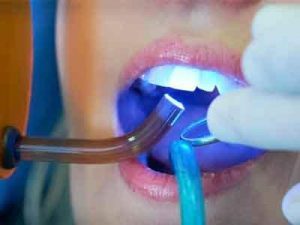- Home
- Editorial
- News
- Practice Guidelines
- Anesthesiology Guidelines
- Cancer Guidelines
- Cardiac Sciences Guidelines
- Critical Care Guidelines
- Dentistry Guidelines
- Dermatology Guidelines
- Diabetes and Endo Guidelines
- Diagnostics Guidelines
- ENT Guidelines
- Featured Practice Guidelines
- Gastroenterology Guidelines
- Geriatrics Guidelines
- Medicine Guidelines
- Nephrology Guidelines
- Neurosciences Guidelines
- Obs and Gynae Guidelines
- Ophthalmology Guidelines
- Orthopaedics Guidelines
- Paediatrics Guidelines
- Psychiatry Guidelines
- Pulmonology Guidelines
- Radiology Guidelines
- Surgery Guidelines
- Urology Guidelines
New dental fillings that last twice as long as standard fillings

USA: A compound called thiourethane generally used to protect wood decks and make car bumpers strong could help in lasting your dental fillings twice as long as the standard fillings, preventing return visits to the dentist's office.
In a study published in the journal Scientific Reports, the researchers have created a filling material that is two times more resistant to break than standard fillings. The new filling uses the additive thiourethane, also used in protective coverings for car and decks.
The team also has developed an adhesive that's 30 percent stronger after six months in use than adhesives that are currently used to keep fillings in place. This new adhesive was described in a recent study published in the journal Dental Materials.
Combined, the new adhesive and the composite are designed to make longer-lasting dental restorations.
"Today's dental restorations typically only last seven to 10 years before they fail," said Carmem Pfeifer, D.D.S., Ph.D., corresponding author of the studies published in Scientific Reports and Dental Materials. Pfeifer is an associate professor of restorative dentistry (biomaterials and biomechanics) in the OHSU School of Dentistry.
"They crack under the pressure of chewing, or have gaps form between the filling and the tooth, which allow bacteria to seep in and a new cavity to form," Pfeifer said. "Every time this happens, the tooth under the restorations becomes weaker and weaker, and what starts as a small cavity may end up with root canal damage, a lost tooth or even life-threatening infections.
"Stronger dental materials mean patients won't have to get fillings repaired or replaced nearly as often," she said. "This not only saves them money and hassle but also prevents more serious problems and more extensive treatment."
The adhesive described in the Dental Materials study uses a specific kind of polymer - known as (meth) acrylamides - that is much more resistant to damage in water, bacteria, and enzymes in the mouth than standard adhesives currently used in dentistry. The composite material described in Scientific Reports uses thiourethane, which holds up much better to chewing.
For further reference follow the link: https://doi.org/10.1038/s41598-019-39003-w

Disclaimer: This site is primarily intended for healthcare professionals. Any content/information on this website does not replace the advice of medical and/or health professionals and should not be construed as medical/diagnostic advice/endorsement or prescription. Use of this site is subject to our terms of use, privacy policy, advertisement policy. © 2020 Minerva Medical Treatment Pvt Ltd